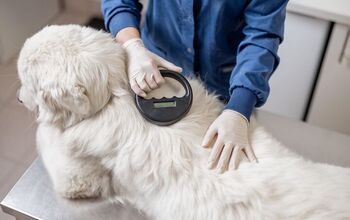Seasonal Allergies Bring Scratches and Sniffles in Our Pets

Typically, pets who suffer from allergies suffer from them the worst in spring and fall. But warmer temperatures this winter have vets all over the country seeing pets with allergy issues sooner than they typically would.
Bluffton, South Carolina vet Dr. Ben Parker says there are sure signs to look for when wondering if your pet may be dealing with allergies. Telltale symptoms include chewing at paws or attempts to consistently rub his face or eyes. Mountain View Animal Hospital vet Dr. Erin Brown, of Rapid City, South Dakota says that the number one symptom of allergy issue is itching, and is typically accompanied by sneezing, dry skin and/or upset stomach.
Related: Fall Allergies in Pets: How to Help Your Pet Through Seasonal Allergies
When pets exhibit these symptoms for two or three days, it may be time to intervene, as secondary infections in ears and respiratory systems could happen if the allergies are not under control.
Dr. Brown says that the easiest way to treat seasonal allergies is to try to minimize exposure to whatever allergen is causing your pet problems. Many dogs are allergic to grass, so taking a lukewarm washcloth to their paws after they’ve been outside or giving them regular baths can help reduce pollen exposure, and in turn, allergic reactions.
Some dogs require more treatment than just minimal allergen exposure, and in those cases, Dr. Parker says that Benadryl (based on a vet’s prescription!) can be a good start to minimize symptoms, but is often not effective. Some supplement their dog’s diet with omegas to help dry, itchy skin and some use prescription medicines like Prednisone or Apoquel, though Prednisone can have some excessive side effects. Efficacy rates for Apoquel in symptom reduction are about 80 percent he says.
Vets also suggest allergy tests, similar to ones humans undergo, in order to assess allergens and create serums to give allergy shots. A few years ago, after constant visits for skin issues and infections, I had my own Golden tested to see what she was allergic to. Not surprisingly, grasses and pollens were at the top of the list, but we heartily laughed at her allergy to ‘human epidermis.’ Believe it or not, it’s a real thing, and monthly allergy shots have made a world of difference in her skin and infections, but mostly to her comfort level.
While you may not need to stock up on tissues for spring hay fever season for your dog, you’ll probably want to watch out for allergy symptoms, and tackle them with these tips!

More by Lori Ennis























